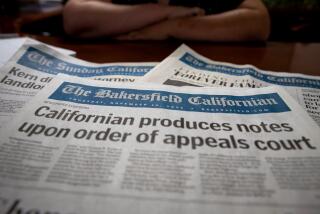Reporters and their sources
- Share via
In ruling that a New York Times reporter must testify at the trial of a former CIA employee accused of leaking classified information, a federal appeals court has adopted a scorched-earth approach to claims that reporters have a right to protect their sources. If the Obama administration persists in its attempt to force James Risen to violate a pledge of confidentiality, the Supreme Court should intervene to protect him.
Last week, the U.S. 4th Circuit Court of Appeals in Virginia ruled 2 to 1 that Risen must respond to a subpoena seeking his testimony in the trial of Jeffrey Sterling. The Justice Department suspects that Sterling was Risen’s source for a description in his book of a failed CIA attempt to provide flawed nuclear weapon blueprints to Iran.
Writing for the majority, Chief Judge William Byrd Traxler Jr. said that Risen’s claim of privilege must be rejected under Branzburg vs. Hayes, a 5-4 decision from 1972 in which the Supreme Court said that requiring reporters to testify before grand juries didn’t violate the 1st Amendment.
That may seem right on the surface, but as Judge Roger Gregory pointed out in dissent, interpretation of the Branzburg decision has been shaped by a concurring opinion filed by one of the five justices in the majority, Lewis Powell. Powell emphasized that the court “does not hold that newsmen … are without constitutional rights with respect to the gathering of news or in safeguarding their sources,” and he suggested that, on a case-by-case basis, judges should balance “freedom of the press and the obligation of all citizens to give relevant testimony with respect to criminal conduct.”
That is exactly what some lower courts have done in recognizing a reporter’s privilege. Others have discerned such a privilege in rules of evidence, approved by Congress, that instruct federal judges to create new privileges using “common law … in the light of reason and experience.”
The appeals court could have ruled for Risen without establishing an absolute privilege. In his dissent, Gregory discussed both the harm caused by the leak and the newsworthiness of the information. He also concluded that the government would be able to introduce substantial circumstantial evidence indicating that Sterling was Risen’s source without forcing Risen to violate his pledge of confidentiality. Weighing all of those factors, he concluded that the subpoena to Risen should be quashed.
Protection for confidential sources helps the media vindicate the 1st Amendment by exposing what Gregory called “misguided policies, poor planning and worse.” That is why nearly all states recognize a reporter’s privilege, through statutes or court decisions. The Supreme Court should ensure that federal courts follow suit by revisiting — and reversing — the Branzburg decision.
More to Read
A cure for the common opinion
Get thought-provoking perspectives with our weekly newsletter.
You may occasionally receive promotional content from the Los Angeles Times.









